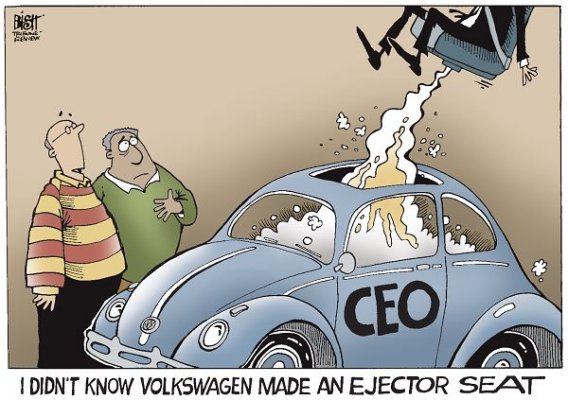So much good information is being shared here, I was hesitant to add anything and just be repetitive, but then I realized I have 1st hand experience with something very closely analogous to this, and some very direct (though brief) 1st hand experience with emission certification as well. But first:
I also would not be surprised if the CEO was kept in the dark. OTOH, he may have also given a wink and a nod, and just "make sure we pass that test", in such a way that the next level understood exactly what he meant. These people are (usually) too smart to put that in an email.
No, an outside company/University brought it to light - check the earlier links.
OK, earlier Midpack noted how the regulatory agencies (govt and private - like UL - this is not a political comment) have to rely on the data the company provides, though this is sometimes/often run through a 3rd party, if applicable. The agencies just don't have the resources to do all this testing themselves.
So that sure sounds like the fox guarding the hen-house. Checks and balances? Well, the products I worked on were subject to a very similar sort of govt health and safety regulation. I can say from 1st hand experience, our MegaCorp took this very seriously. I worked with the dept that did this test, and the other engineers that interfaced with them. There was a bit of a "Chinese Wall" between us and the actual testers, they didn't want some error or wrong thought process going across the two, that was a sort of check and balance. And we had to pass the test with some margin. It was a very difficult test to perform, took very specialized equipment, and was subject to variation depending on exactly how the test was performed. We didn't want to 'fail' due to a little test variation. I don't know, but we might have then sent it out to a 3rd party for independent testing, to submit those results to the agency, but we tested in house to have the confidence that the design would pass a 3rd party test.
During a critical point where we thought we might have had a few days of production of some of a product that might be slightly out of spec due to a slip up in our production process, they called in the guy that ran the test on that product from vacation, because the QC VP didn't want to take any risk that someone else might repeat the test in some slightly different fashion (though it was all carefully documented). They were serious about this stuff.
I could not imagine our MegaCorp cheating on this test. Not because of ethics - we used to say some of these guys would run over their grandmothers to get a shipment out the door and get it on the books for the quarter. But failing this test would bring similar negative press as VW (maybe worse). Checks and balances? Our competitors performed this test as well. We tested their products, they tested ours, that was a given (to learn from them as much/more than 'checking up' on them). If we were out of spec, they would have managed to get word to the media. I'm sure we would have done the same.
I'm a little surprised that VW competitors didn't see this. True, if they ran the strict EPA test profile, they'd get the same results. But they would be smart enough to do some other 'real world' tests. Some think that the other companies are guilty as well, but so far I don;t think these tests have shown problems with other vehicles.
My other 1st hand experience - I actually viewed an EPA emissions test run in the 80's. I knew an automotive engineer that worked on pollution controls, and went into work with him for a day. This wasn't a final certification test, but just an intermediate test, the engineers were just trying to validate the performance of some of the changes they made. The car's on a dyno, a driver has to follow a chart to keep the vehicle speed right within a certain range on this chart. Several cycles of accel, braking, idle, etc. The driver was like a skilled video game player. He knew just how to 'play' the pedals to keep it in range, and not get the equivalent of a TILT alarm, but still drive such to keep things as low as possible.
Since this was a test run, they had scopes and meters and dataloggers hooked up to everything, i addition to the actual tailpipe measurement. It was interesting to see. Yes, a computer/robot could replace that driver for even more consistency.
One more observation - if VW had just cheated by a little, they could have gotten away with it, because any 'real world' test will have variation compared to a dyno test. They got 'greedy' by emitting multiples (5x to 40x?), rather than just 20% more or something. That was just stupid.
-ERD50


